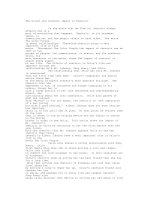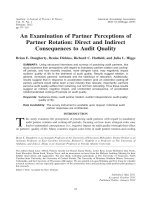the direct and indirect impact of rhetoric
Bạn đang xem bản rút gọn của tài liệu. Xem và tải ngay bản đầy đủ của tài liệu tại đây (23.17 KB, 2 trang )
The Direct and Indirect Impact of Rhetoric
In the world that we live in, rhetoric always
affects and is a
part of everything that happens. Rhetoric, in its broadest
sense, is
communication, and how people relate to each other. The movie
The Color Purple
is about relationships. Therefore rhetoric plays a very
important role in this
movie. Throughout The Color Purple the impact of rhetoric can be
seen in two
groups of people, the communicator, or rhetor, and the audience.
Celie, the
main character of the movie, shows the impact of rhetoric in
almost every aspect
of her life. The effects of rhetoric in Celie's life are
apparent through her
relationships with Mr. Johnson, Shug Avery, and Sofia.
The relationship that Celie has with Mr. Johnson
is unbalanced
from the first time they meet. Celie's complacent and gentle
nature leave her
at the mercy of Albert Johnson's more dominant attitude. The
rhetoric that she
expresses to him, of innocence and always complying to his
orders, forces her to
live a large portion of her life sheltered and overshadowed by
Albert, who
continuously beats her into submission. Celie also passes on
what she learned
from “Mister” to his son Harpo, the rhetoric of “the importance
of a man giving
his wife a good beating.” Albert Johnson does not even realize
how important
Celie is to him until she is gone. At that point he returns some
of the love
that is shown to him by helping Nettie and her family to return
to the United
States in order to see Celie. This action shows the impact of
Mr. Johnson's
rhetoric on Celie by returning to her the first person that she
ever loved.
Both the rhetoric that Mr. Johnson exposes Celie to and the
rhetoric that Celie
reveals to Albert Johnson have a very important role in Celie's
life in the
movie The Color Purple.
Celie also shares a strong relationship with Shug
Avery. Celie
first meets Shug when she is drunk and has a very bad temper.
Celie just tries
to comfort the sick stranger in her house. In this unselfish act
of kindness,
Celie's rhetoric ends up giving her the best friend that she has
for a long time.
Shug then returns the rhetoric of kindness and love that Celie
first shows her
by writing a song to cheer her up. Celie's newfound friend also
teaches her how
to smile, and perhaps how to enjoy life and respect herself.
Shug Avery also
helps Celie discover that Nettie is writing her and where to find
the letters.
Celie's rhetoric in her relationship with Shug let her gain a new
friend,
contact with her beloved sister, and rediscover a joy and purpose
to her life.
Rhetoric also has a strong impact in the
relationship between
Celie and Sofia. After Sofia's jail sentence she is very
depressed, and Celie
helps her do the grocery shopping. Showing her rhetoric of
friendship and
kindness once again, Celie shows Sofia a friend when she needs
one the most. At
the family dinner one night, Celie expresses her true feelings in
an outburst of
rhetoric. This reawakens the spirit inside Sofia and allows her
to admit to
Celie how she helped her and that people do understand and love
her. Without
first affecting Sofia with her rhetoric, Celie would not have
experienced the
assurance of Sofia's rhetoric in her life.
Rhetoric is present in the relationships between
Celie and Mr.
Johnson, Shug Avery, and Sofia. This rhetoric affects Celie in
many ways and
from different directions. Celie is affected by how she relates
to others
through rhetoric and how others relate to her through rhetoric.
In some cases
Celie's rhetoric has an impact on someone else and then later
works its way back
to her. Mr. Johnson is exposed to Celie's kindness and
friendship a long time
before he shows her some of the same respect. Shug Avery is also
affected by
the rhetoric of Celie before she is in turn impacted by Shug's
friendship.
Celie gives Sofia the assurance that she needs and then receives
the same from
Sofia when she is in need of support. In all of these
relationships Celie is
affected directly by the rhetoric of the other people and
indirectly by the
influence of her own rhetoric.









